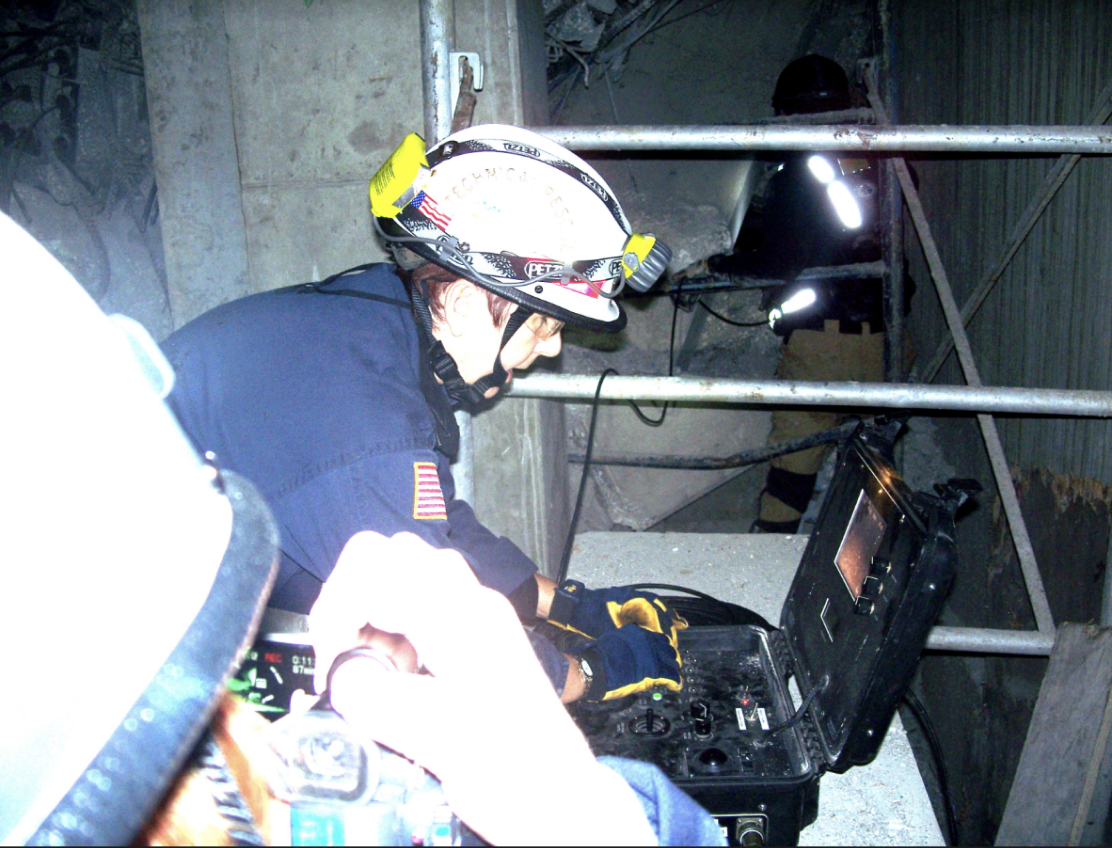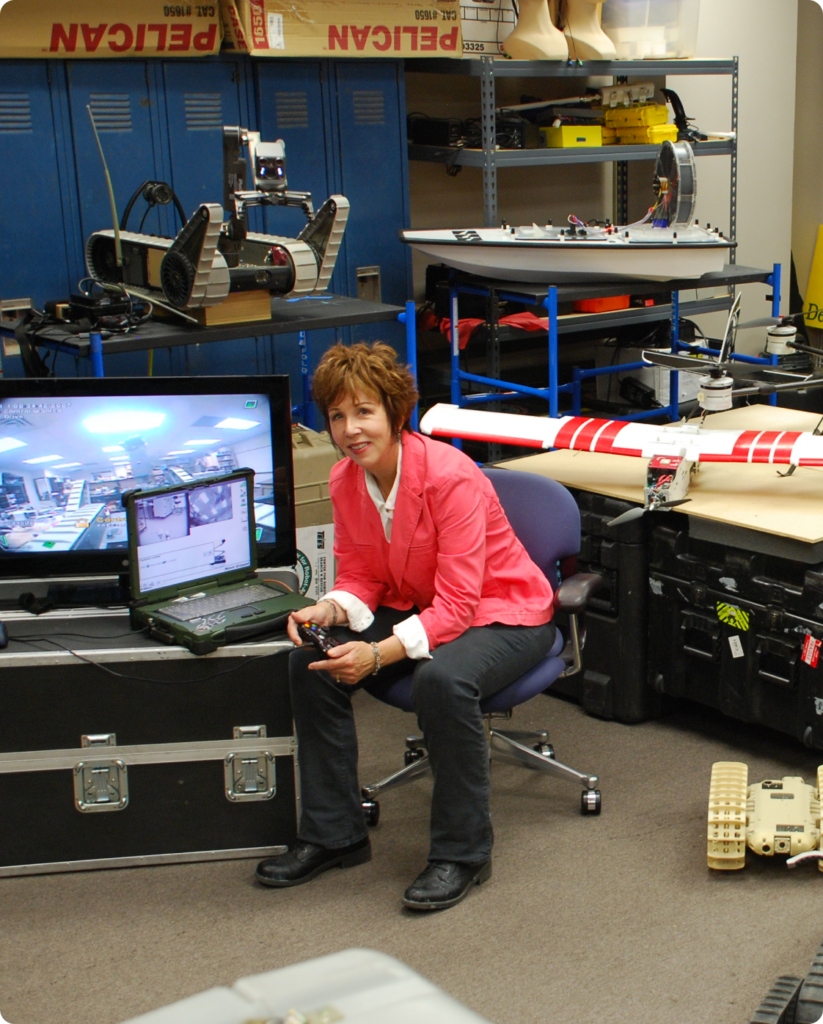Who is Robin Murphy?
Robin Murphy is a professor, science communicator, and award-winning founder of disaster robotics that continues to shape/direct/influence/guide global best practices in how robots are used in disasters. Her ongoing research focuses on the development and application of artificial intelligence in robots used for emergency response, as well as how humans & robots interact in these contexts.
As the pioneer of disaster robotics, Robin has not only worked with ground, aerial, and marine robots and developed their software, but has also been an active field responder in over 30 disasters in 5 countries including the World Trade Center attacks, Hurricane Katrina, Hurricane Charley, Hurricane Harvey, Fukushima, and the Syrian Refugee Crisis in Greece.
Robin’s contribution extends beyond the four walls of her laboratory. Her research in the field of disaster robotics has informed the policies of the European Union on the use of small UAS for disasters and the National Fire Protection Agency.

She also co-founded the Center for Robot-Assisted Search and Rescue (CRASAR), the non-profit organization that fosters the effective use of unmanned systems by formal emergency management agencies.
She has over 200 publications on artificial intelligence, human-robot interaction, and robotics including the seminal textbook “Introduction to AI Robotics and Disaster Robotics.” Dr. Murphy is a member of the IEEE Robotics and Automation Society Administrative Committee and co-founded the Technical Committee on Safety Security and Rescue Robotics and its annual conference. She serves on several government and professional boards, most recently the Defense Science Board.
She’s received several awards for her contributions to disaster robotics and is one of the most recognized voices when it comes to accurately educating the public and professionals about robotics.

As a role model and mentor promoting inclusion in the traditionally predominantly male field, Robin serves on the Women In Robotics International Advisory Board. She was the first woman to graduate with a PhD in robotics from the Georgia Tech from the College of Computing, the first woman to fly drones at a disaster and the first female on the IEEE Robotics and Automation Society executive committee.
She has recruited and advised 26 women, 1 disabled woman, 3 African Americans, 7 Latinos, and 1 Indigenous People student. Three of her female students have been awarded prestigious NSF Graduate Fellowships. She is currently working with 47 students in four low-income, high schools where over 70% of the students are from underrepresented groups

Recognized as one of ”30 Most Innovative Women Professors Alive Today”, Robin is renowned for her innovative methods that use science fiction to teach about robotics.
Through her website, Robotics through Science Fiction, and book series of the same name, along with her monthly column for Science Robotics, Robin uses sci-fi to explain fundamental concepts such as behavior-based robotics, or the belief-desire-intention model of artificial intelligence.
Her commentary and insights on disaster robotics and robots in science fiction are regularly featured on Wall Street Journal, Time, BBC, CNN, Washington Post, and more. Her diverse academic and field background (academic/researcher/professor/field worker/sci-fi geek) allows her to connect with wide-ranging audiences by delivering engaging, accurate and meaningful content on everything and anything to do with robots, AI and robots in sci-fi.


Select studies led by Robin
- CCC/NAE Workshop Report- The Role of Robotics in Infectious Disease Crises Gregory Hager (The Johns Hopkins University), Vijay Kumar (The University of Pennsylvania), Robin Murphy (Texas A&M University), Daniela Rus (Massachusetts Institute of Technology), and Russell Taylor (The Johns Hopkins University), 2020
- Research Agenda in Intelligent Infrastructure to Enhance Disaster Management, Community Resilience and Public Safety, R. R. Murphy, co-author, Computing Community Consortium, white paper, May 2017.
- Toward a Science of Autonomy for Physical Systems: Disaster Management, R. R. Murphy, author, Computing Community Consortium, one of 8 white papers in the Toward a Science of Autonomy for Physical Systems series, June 2015.
- Roadmap for the Adoption of Unmanned Systems into Public Safety, R. Murphy author, result of a study within the IEEE Safety Security Rescue Robotics technical committee leading to recommendations that were incorporated into the National Robotics Initiative, 2013.
- The Role of Autonomy in DoD Systems, R. R. Murphy and James Shields, Eds., Defense Science Board, US Department of Defense, 2012.
- Critical Real-Time Computing and Information Systems (CRICIS): A Report from the Community, R. R. Murphy and Trevor Darrell, authors, Computing Community Consortium, June 2012.
Awards for humanitarian and Academic Contributions
ACM Eugene L. Lawler Award for Humanitarian Contributions
Motohiro Kisoi Award for Rescue Engineering Education (Japan)
(This award was started in honor of Motohiro Kisoi, a promising graduate student from Kobe University who died in a residential building collapse during the Kobe Earthquake in 1995. The award highlights the need for research that directly speeds up search and rescue and reminds us that real people die in disasters.)
AUVSI Foundation Al Aube Outstanding Contributor Award
(This award is given to an operator of an uncrewed vehicle (robot). I was the first professor to ever be given the award, which was for my work in fielding disaster robots.)
US Air Force Exemplary Civilian Service Award
for distinguished service on the USAF Scientific Advisory Board, 2005
NSF CISE Distinguished Lecture, "Robot-Assisted Search and Rescue from 9/11 to Now: Where's the IT?" Nov. 11, 2002
(This lecture is given by scientists of the highest caliber and has been compared to the Turing Award lectures for NSF)
Eagle Award, National Institute for Urban Search and Rescue, 2001
(This is the highest award given and recognizes leadership in some aspect of search and rescue; in this case for role in introducing ground robots at the World Trade Center disaster)
IEEE Distinguished Visitor, IEEE Computer Society, 2001-2002
Nils Nilsson Technical Achievement Award, American Association for Artificial Intelligence, 2000
Elected as an ACM Fellow in 2019
“for contributions in founding and advancing the field of computing for disasters and robotics”
Made an IEEE Fellow
“for contributions to rescue robotics and insertion of robots into major disasters”
Emergency Management Technology and Innovation Award
for the 100+ flights for Hurricane Harvey from the Emergency Management Association of Texas for the work with sUAS at Hurricane Harvey (as part of CRASAR)
Honorable mention 2015 American Publishers Awards PROSE Award
for best writing in Engineering and Technology for Disaster Robotics (MIT Press, 2014)
2023 Distinguished Achievement Award, presented by The Association of Former Students at Texas A&M University
For extension, outreach, continuing education and professional development. This prestigious award is one of the highest university honors that can be bestowed upon a faculty or staff member
What they say about Robin
As one of the top international researchers in search and rescue robotics and a true pioneer in multiple respects, Robin Murphy has focused her considerable expertise from field exercises into a concise manual that doubles as both an accessible tutorial and an authoritative reference. An excellent resource!
Richard Voyles, Associate Dean for Research, Purdue College of Technology
I would strongly recommend this book for anyone doing (or looking to do) disaster robotics or work in difficult environments. I would recommend this book for the last section even if the other sections were not in existence.
I give this 5 out of 5 stars (I think this is the first review that I am giving 5 stars, it almost feels wrong).
David Kohanbash, Robots for Roboticists
Featured in




For Advisory, Consulting, Speaking Engagements and Media Appearances
For Disaster & Emergency Management Support & Ttraining
In their words

“Innovator in AI”

“Alpha Geek”

“Most Influential Women in Technology”




